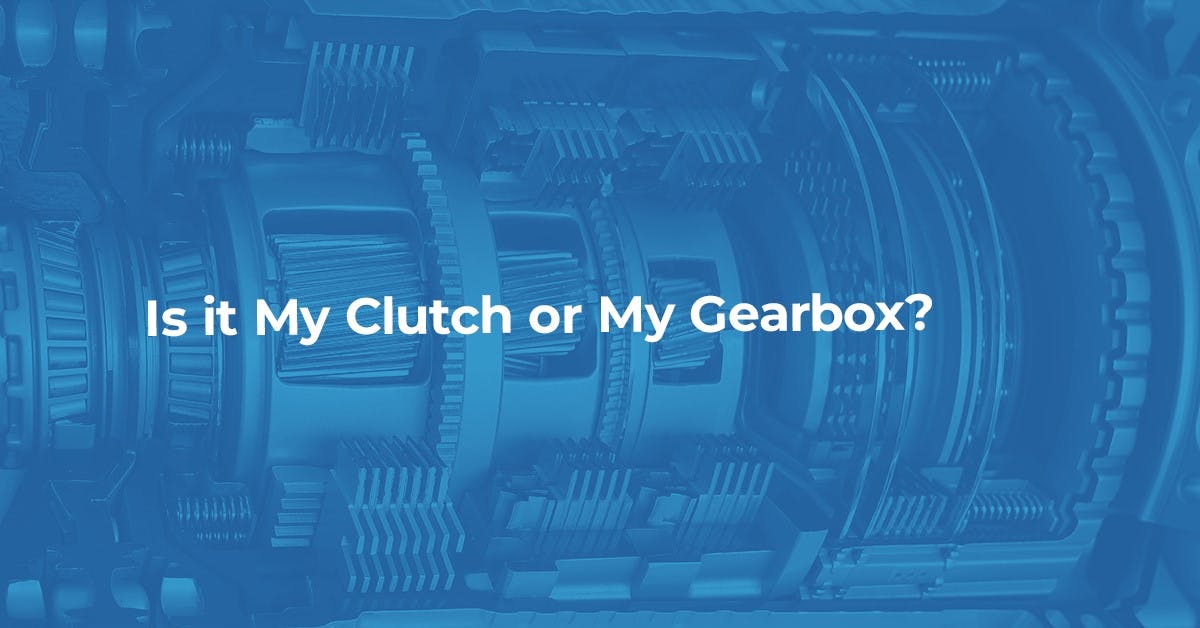As the clutch in modern cars lies between the engine and gearbox, it can sometimes be difficult to tell whether it’s your vehicle’s clutch or gearbox that’s at fault.
In this blog, we cover the subtle signs and distinct symptoms that can help you distinguish between clutch and gearbox problems.
Page Contents
Is It My Clutch or My Gearbox?
Common clutch problems include a slipping clutch, difficulty changing gears, unusual noises and a soft or vibrating clutch pedal.
Your gearbox may be faulty if it is difficult to engage gears, or you notice gear slippage or grinding noises when shifting.
However, it can be difficult to determine whether the clutch or the gearbox is to blame.
Both parts can have overlapping symptoms – with both causing gear shifting problems, strange noises and difficulty changing gears.
To get an accurate diagnosis, a professional mechanic may need to inspect both components to identify the root cause of the issue for you.
Slipping Clutch
Most likely? A clutch problem.
Clutch slipping happens when a clutch fails to engage or disengage the transmission – otherwise known as the gearbox.
When the clutch slips, this can result in a brief loss of acceleration – normally as you release the pedal after changing gear.
Clutch slipping can be caused by aggressive driving habits and driving at high RPMs, which can cause excessive wear and tear on the clutch system.
Squeaking Noises
Most likely? A clutch problem.
If you notice a squeaking noise when you engage and disengage the clutch pedal, then this could be a sign of clutch failure.
If the noise occurs even as the engine is turned off, then your clutch release mechanism could be the issue – likely the result of poor lubrication.
A rattling or clicking sound can usually be attributed to a loose clutch release fork or a faulty throwout bearing.
You can press the clutch pedal all the way down and listen for any strange sounds to be sure the clutch is causing problems.
Clutch Pedal Stays on the Floor
Most likely? A clutch problem.
Your clutch pedal should feel firm when you push down on it, but there should still be some resistance to this pressure.
If you cannot change gears and your clutch pedal reaches the floor, then you may be experiencing clutch problems.
Your vehicle may have a cable system or a hydraulic system.
If your vehicle uses a hydraulic clutch, then the problem could relate to master cylinder failure.
If it is operated using a cable, then the cable may have snapped.
Difficulty Accelerating
Most likely? A clutch problem.
If you can rev the engine but struggle to accelerate, then your clutch could be worn out.
Any vibration in the clutch pedal when you try to accelerate can also be a sign of clutch failure.
The vibration can be caused by any of the following:
- The clutch disc struggling to grip the flywheel
- A damaged pressure plate
- A worn-out flywheel
- A worn-out clutch disc lining
Fluid Leak
Most likely? A clutch problem.
If the clutch fluid levels drop suddenly – or you notice a puddle of clutch fluid under the car or around the gearbox – then there could be a leak in the system.
Your clutch won’t work properly as a result.
Noisy Gearbox
Most likely? A gearbox problem.
If your gearbox is making a squeaking sound, then bearing, gear and shaft wear could be the cause.
You may also hear a clunking or buzzing noise during gearshifts.
You should not drive the car if you hear this, as you could cause additional damage to the gearbox.
Have your vehicle looked at by a professional mechanic as soon as you can.
Difficulty Shifting Gears
Most likely? A gearbox or clutch problem.
If you struggle to change gears, then a faulty gearbox could be the cause.
Difficulty shifting gears can be caused by:
- Damaged clutch linkage
- Excessive tough shifter lock spring
- Damaged main shaft spines
To determine whether the fault lies with the clutch or the gearbox, turn off the engine and try to change gears.
If you can change gears, then the issue is more likely to be with the clutch than the gearbox.
Slipping Gears
Most likely? A gearbox problem.
Slipping gears is when your vehicle reverts to a previous gear during a gear shift.
This can make it difficult to control your vehicle, posing real dangers when driving.
You may hear a whining noise if your car’s gears are slipping, which can be attributed to several potential causes:
- A faulty gearbox
- Lack of transmission fluid
- A damaged shift fork
- Misaligned engine
How Do I Know If My Clutch Is Going?
Your clutch may be going if you notice any of the following warning signs:
- Difficulty shifting gears
- Squeaking noises when clutch pedal is pressed
- A spongy or vibrating clutch pedal when pressed
- Poor acceleration
- A slipping clutch
How Do I Know If My Gearbox Is Going?
The main indications of a gearbox problem are:
- Fluid leakage
- Loss of power
- A burning smell
- Difficulty shifting gears
- An illuminated check engine light
- A clunking noise during gear shifts
Should I Replace My Clutch or Gearbox?
If you think your clutch is failing – because you’ve notice strange noises, difficulty accelerating or the clutch pedal touches the floor – then you should book a clutch replacement as soon as possible.
As for your gearbox, you will likely need to book a gearbox repair if the issue lies with this part – though this will depend on factors like the age and condition of your vehicle.
A professional mechanic will be able to advise you further.
We hope you have enjoyed learning about clutch and gearbox problems.






